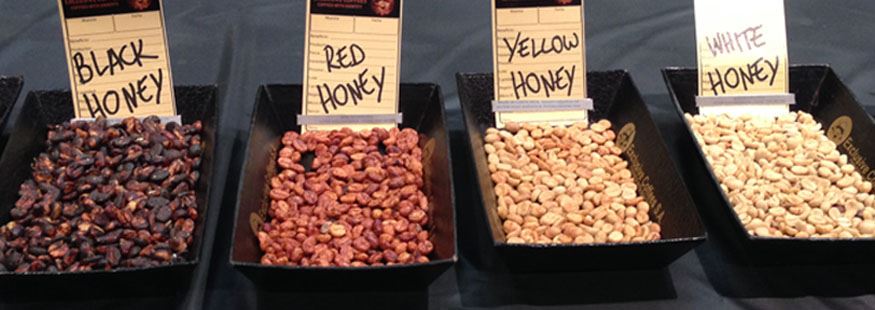A Pulped Natural by Any Other Name...

Pulped natural aka honey, semi-washed, semi-lavado, or whichever name the process is going by currently, is a relatively new method to the world of coffee processing.
Often associated with third-wave
coffee entrepreneurs, the process has become synonymous with speciality grade
and microlot coffees. Despite this current association, the process was first established
from an economic standpoint as it allowed producers to more efficiently utilise
patio space, thus increasing their yield of coffee. Typically, pulped natural
coffees will present more sweetness, a fuller body and less acidity than washed
coffees.
While the processing method goes by
many different names, broadly speaking there is little differentiation between them
– we can delve into the technicalities a little later. The pulped natural
process is essentially a hybrid of the two typical methods of processing; fully
washed and natural. The process was first pioneered in Brazil during the 1990s,
and was largely derived to increase efficiency during the drying stage.
Naturally processed coffees can take up to four weeks to fully dry and demand large
amounts of space and constant attention, both of which are costly. The pulped
natural process halves the time in which a coffee is spread out to dry on
patios, resulting in an increased yield of 50 percent.
As the name suggests, pulped natural coffees are dried the same as naturally processed coffees, however they are pulped prior to drying. The pulped natural process is similar to the washed process in that both methods begin by pulping the harvested cherries. During this process the cherry is split open and the bean is squeezed out of the cherry skin with the sticky, sugary mucilage still attached. After this procedure, the similarity between the two processes ends. Cherry destined to be washed coffee will make its way to large fermentation tanks, while pulped natural coffees will be taken directly to be dried with the mucilage clinging to the outside of the parchment. The cherry can be pulped with a depulper, or with a mechanical demucilager. Mechanical demucilagers can be programmed to alter the amount of mucilage that is left on the parchment. The mucilage covered parchment must be dried in the sun on patios or drying beds made of very flat, even surfaces. Mechanical dryers cannot be used for coffees processed through this method as the sticky mucilage will adhere to the walls and damage the machinery. The drying stage of the pulped natural process is a delicate and integral phase requiring constant attention. The beans must be rotated frequently to ensure they dry evenly and avoid fermentation. The layer of mucilage will dry onto the bean imparting sweetness, a full mouth-feel and levelled acidity, and consequently changing the flavour profile of the coffee.
The introduction of mechanical demucilagers to the industry has added a new differential in pulped natural processing. The ability to alter the percentage of mucilage left on the bean during pulping offers producers an unprecedented level of control. This allows for unlimited experimentation and effectively permits producers to craft a desired cup profile. These adjustments explain the differing terminology in describing the pulped natural process. We are beginning to see different pulped natural coffees coming out of origin being classified as specific honey lots; specifically black, red, yellow and white. The term honey is referring to process and the colour in the name denotes the amount of mucilage left on the bean - black being the most and white being the least, however this also acts as a visual identifier when the coffee is in parchment.
Whilst we are continuing to see an increase in specialty pulped natural or honey coffees, sourcing or gaining access to a mechanical demucilager can be costly and is not readily available to all producers.
Currently we have two honey processed microlots available for purchase, the UTZ India Kelagur Heights SLN6 SLN9 S-795 Pulped Sundried Honey and the Costa Rica Dota Tarrazu Coopedota R.L. Honey.
We are also excited to have secured three different pulped natural lots from Costa Rica this year; Maticas El Centro Dota Red Catuai Yellow Honey, Herbazu Katia Villa Sarchi Yellow Honey, and the Puente Tarrazu La Pena Caturra White Honey. Due in mid-July, stay tuned as these extra special microlots will not be around for long.
To receive samples or purchase any of our honey lots contact our office, PM us on Facebook or Tweet @HABennetts.


